
 Black History Guide: Additional Resources |
The following is a list of articles, finding aids, and other resources that have been compiled in the past relating to African Americans records at the National Archives, as well as a list of other databases and resources not associated with the National Archives or the Federal Government.
Articles
- “Black Men in Navy Blue During the Civil War’ by Joseph P. Reidy, Prologue Magazine, Vol. 33, No. 3 (Fall 2001)
- “Exploring the Life and History of the ‘Buffalo Soldiers’"; by Walter Hill, The Record (March 1998)
- “The Freedmen’s Bureau Preservation Project"; by Reginald Washington, Prologue Magazine, Vol. 34, No. 2
- “Incited by the Love of Liberty: The Amistad Captives and the Federal Courts’; by Bruce A. Ragsdale, Prologue Magazine, Vol. 35, No. 1 (Spring 2003)
- “Living with the Hydra: The Documentation of Slavery and the Slave Trade in Federal Records"; by Dr. Walter B. Hill, Jr., Prologue Magazine, Vol. 32, No. 4 (Winter 2000)
- “Marriage Registers of Freedmen"; by Elaine C. Everly, Prologue Magazine, Vol. 5, No. 3 (Fall 1973)
- “Researching African Americans in the U.S. Army, 1866-1890: Buffalo Soldiers and Black Infantrymen"; by Trevor K. Plante, Prologue Magazine, Vol. 33, No. 1 (Spring 2001)
- “The Rost Home Colony, St. Charles Parish, Louisiana"; by Michael F. Knight, Prologue Magazine, Vol. 33, No. 3 (Fall 2001)
- “Sealing the Sacred Bonds of Holy Matrimony: Freedmen’s Bureau Marriage Records"; by Reginald Washington Prologue Magazine, Vol. 37, No. 1 (Spring 2005)
- “’Their…Bedding is wet. Their floors are damp’, Pre-Bureau Records and Civil War African American Genealogy"; by Rebecca K. Sharp Prologue, Vol. 39, No. 2 (Summer 2007)
Special Issue of Prologue Magazine regarding the use of federal records in African American historical research - Vol. 29, No. 2 (Summer 1997)
-
“Voices of African Americans in Federal Records";
by John W. Carlin
An introduction from the former Archivist of the United States
-
“In Memory of Sara Dunlap Jackson, May 28, 1919 – April 19, 1991"; by Ira Berlin
Dedication
-
“A Guiding Light"; by Dr. Debra Newman Ham
Background on the publication and work for the original Black History: A Guide to Civilian Records in the National Archives
-
“African Americans and the American Labor Movement"; by James Gilbert Cassedy
A brief primer on where to locate records relating to labor and African Americans
-
“An Archival Odyssey: The Search for Jackie Robinson"; by John Vernon
Records in the holdings relating to Jackie Robinson
-
“Black Domestics During the Depression: Workers, Organizers Social Commentators"; by Phyllis Palmer
An account of how the life of domestic workers is documented at the National Archives among various record groups
-
“Documenting African Americans in the Records of Military Agencies"; by Lisha Penn
Background on Reference Information Paper 105: Records of Military Agencies Relating to African Americans from the Post-World War I Period to the Korean War
-
“Documenting the Struggle for Racial Equality in the Decade of the Sixties"; by Geraldine N. Phillips
An overview of records that may be restricted or were recently made available concerning major Civil Rights episodes including: the assassination of Dr. Martin Luther King, Jr., the wiretapping of Dr. King, and the office files of Assistant Attorneys General that document the involvement of the Department of Justice Civil Rights Division
-
“Freedmen’s Bureau Records: An Overview"; by Elaine C. Everly
An overview of the records relating to the Freedmen’s Bureau from RG 105
-
“The Freedman’s Savings and Trust Company and African American Genealogical Research"; by Reginald Washington
An overview of records in the Office of the Comptroller of the Currency (RG 101) relating to the Freedman’s Bank
-
“From Slave Women to Free Women: The National Archives and Black Women’s History in the Civil War Era"; by Noralee Frankel
An overview of the Civil War pension files and Freedmen’s Bureau records relating to African American women
-
“From Sophie’s Alley to the White House: Rediscovering the Visions of Pioneering Black Government Photographers"; by Nicholas Natanson
A look at African American government photographers, Robert McNeill and Steve Wright, and the work produced that may be found in the records of the National Archives
-
“Institutions of Memory and the Documentation of African Americans in Federal Records"; by Dr. Walter B. Hill, Jr.
Brief history of the process of using federal records for African American research and the institutions established to foster that research
-
“The Lion’s History: Researching World War II Images of African Americans"; by Barbara Lewis Burger
The story of how the publication Pictures of African Americans During World War II came together
-
“The Panama Canal: The African American Experience"; by Patrice C. Brown
An introduction to the Records of the Panama Canal (RG 185) and the African Americans that worked on its construction
-
“Preserving the Legacy of the United States Colored Troops"; by Budge Weidman
Story of how the records of the USCT were processed and indexed
-
“Slave Emancipation Through the Prizm of Archives Records"; by Joseph P. Reidy
A survey on various records and how they can be used to reconstruct a picture of the lives of African Americans after Emancipation
-
“The USIA Motion Picture Collection and African American History: A Reference Review"; by Donald Roe
Motion picture holdings from the United States Information Agency (RG 306) relating to African Americans
Reference Information Papers
-
Black Family Research: Records of Post-Civil War Federal Agencies at the National
Archives
Covers records of Bureau of Refugees, Freedmen, and Abandoned Lands (RG 105); Freedman’s Savings and Trust Company; Commissions of Claims. Records provide data on family life, property ownership, military service, work life.
- Records of Military Agencies Relating to African Americans from the Post-World War I Period to the Korean War, RIP 105
Reference Reports
-
African-Americans and the Federal Census, RR 103 & 305
This report refers to microfilm that is available for records in the Bureau of the Census (RG 29) and breaks down the different types of censuses taken from 1790-1930.
-
Federal Census Records for the District of Columbia Relating to Slavery, RR 107 & 610
This reports refers specifically to censuses taken in the District of Columbia from 1800-1840, which gave information on enslaved and free African Americans living in households.
-
Federal Court and Commission Records Relating to Slavery in the District of Columbia, RR 106 & 609
This report refers to records from the District Courts of the United States (RG 21), that include papers relating to the emancipation and manumission of enslaved peoples, fugitive slave cases, and habeas corpus cases. There is also reference to records of the Accounting Officers of the Department of the Treasury (RG 217), from the board of commissioners for the emancipation of slaves.
- Freedmen’s Bureau Records by State
The following is a list of reference reports relating to the Freedmen’s Bureau (RG 105), specific to each state. Each refers to administrative, education, field office, and other records:
- Alabama, 1867-1872, RR 113
- Arkansas, 1865-1872, RR 114
- District of Columbia, 1865-1872, RR 104 & 603
- Florida, 1865-1872, RR 115
- Georgia, 1865-1872, RR 109
- Kentucky, 1865-1872, RR 116
- Louisiana, 1865-1872, RR 108
- Maryland and Delaware, 1865-1872, RR 110
- Mississippi, 1865-1872, RR 117
- Missouri, 1865-1872, RR 118
- North Carolina, 1865-1872, RR 111
- South Carolina, 1865-1872, RR 112
- Tennessee, 1865-1872, RR 119
- Texas, 1865-1872, RR 120
- Virginia, 1865-1872, RR 121
- This report refers to records relating to the Freedman’s Bank (RG 101), which served formerly enslaved peoples and their families as a banking and investment institution.
- This report refers specifically to Freedmen’s Bank records relating to residents in the District of Columbia.
- This report refers to microfilm of the administrative records in the Freedmen’s Bureau (RG 105) including annual reports of the Bureau, activities of the Bureau in different states, schools, education, and marriage.
- This report refers to microfilmed and textual records from the Adjutant General’s Office (RG 94) that contain information on military service (including joining and muster information) and pension records for the USCT.
- Patients and Staff at the Freedmen’s Hospital, Washington, DC, in the Federal Censuses, RR 123, 310, 621
- The report refers to Census records (RG 29) that listed staff and patients living at the Freedmen’s Hospital from 1870-1940, which would eventually become Howard University Hospital in 1975.
- Records of the Mississippi Freedmen’s Department (Pre-Bureau Records), RR 122
- This report refers to microfilmed records from the Department of the Mississippi (RG 105) – an organizational precursor to the Freedmen’s Bureau, which helped refugees and contrabands during the Civil War, and also provided food, medical attention, shelters, and issued marriage licenses.
- This report refers to micorfilmed records on pension files, registers of enlistments, commissions, cavalry and
- infantry, courts martial, and medals of honor that include information about the Buffalo Soldiers. The records are culled from various sources, including: Department of Veterans Affairs (RG 15), Adjutant General’s Office (RG 94), US Regular Army Mobile Units (RG 391), Office of the Judge Advocate General (RG 153), and the Bureau of Naval Personnel (RG 24).
- 1936-1938
Additional Sources of Information
- African Americans in the Federal Census –PowerPoint Presentation
A short guide on how to us census records to find genealogical information about African Americans
- Harry S. Truman Presidential Library and Museum – Desegregation of Armed Forces
-
- National Archives at Atlanta
-
- Civil Liberties Cases Located at Atlanta
- A Checklist of records available
- List of Microfilm available relating to African American History
- Lists of Slave Manifests from RG 36
-
- Beaufort (Outbound)
- Charleston (inbound)
- National Archives at Chicago
- National Archives at Philadelphia
- Online Exhibit:
Fugitive Slave Case: A Slave Named Stephen Pembrook
Exhibit regarding the 1854 case of Jacob Grove and Stephen Pembrook, which came about from the Fugitive Slave Act of 1850
Records from the RG 21, Records of the District Courts of the United States - Online Exhibit: Portrait of Black Chicago
-
- A photo series by John White taken in the 1970s
- Pictures of African Americans During World War II
- Slave Manifests of Coastwise Vessels Filed at New Orleans, Louisiana, 1807-1860
- Teaching with Documents:
The Amistad Case
This plan uses original documents from the Amistad court case, located at the National Archives at Boston.
- Teaching with Documents:
The Fight for Equal Rights: Black Soldiers in the Civil War
This is a lesson plan centered on students learning about the Civil War and Reconstruction using primary documents.
- Teaching with Documents:
Fugitive from Labor Cases: Henry Garnett (1850) and Moses Honner (1860)
This lesson plan focuses on two cases that fell under the Fugitive Slave Act.
- Teaching with Documents: Photographs of the 369th Infantry and African Americans during World War I
- Records that Pertain to American Slavery and the International Slave Trade
- List with short description of documents relating to the slave trade
Non-NARA Resources
Websites from other Federal Agencies:
Central Intelligence Agency (CIA)
Library of Congress
- Afro-American Genealogical Research Guide
- The African American Mosaic Resource Guide
- African American Odyssey Exhibit)
- African American Sheet Music Collection
- Carl Van Vechten Photographs Collection
- Daniel A. P. Murray Pamphlets Collection, 1818-1907
- NAACP: A Century in the Fight for Freedom
National Park Service
- African American Heritage Page
- Civil War Soldiers and Sailors Database
- National Archives for Black Women’s History, at the Mary McLeod Bethune Council House
Smithsonian
- National Air and Space Museum: Black Wings – African American Pioneer Aviators
- National Museum of African American History and Culture
Local State and Regional Pages:
Illinois
- Columbia College Chicago: Center for Black Music Research
Indiana
- Indiana University-Bloomington: Archives of African American Music and Culture
- Indiana University-Bloomington: Black Film Center/Archive
Maryland
Missouri
- Black Archives of Mid-America
- Missouri State Archives: Missouri’s African American History
Ohio
New York
- New York Public Library: Schomburg Center for Research in Black Culture
- New York State Archives: Records Relating to African Americans Leaflet
North Carolina
- University of North Carolina-Chapel Hill: Documenting the American South
South Carolina
- College of Charleston: Avery Research Center
Virginia
- University of Virginia: Race and Place: African American Community Histories
- Virginia Commonwealth University: Through the Lens of Time – Images of African Americans from the Cook Collection
- Virginia Historical Society: Unknown No Longer
Washington, DC
- DC Public Library: The Black Renaissance in Washington, 1920s-1930s
Wisconsin
- University of Wisconsin-Milwaukee: Researching African Americans in the Archives Department
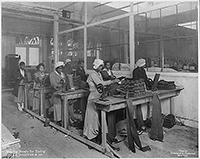 Manufacturing Spiral Puttees at Plant of Alexander Propper & Company, 1918National Archives ID 533756
Manufacturing Spiral Puttees at Plant of Alexander Propper & Company, 1918National Archives ID 533756 Black Youths Play Basketball at Stateway Gardens Highrise Housing Project, 1973National Archives Identifier 556162
Black Youths Play Basketball at Stateway Gardens Highrise Housing Project, 1973National Archives Identifier 556162
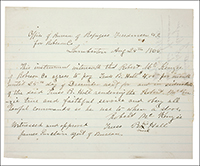 Agreement for Labor of Truss B. Hall, 8/28/1865 National Archives Identifier 595055
Agreement for Labor of Truss B. Hall, 8/28/1865 National Archives Identifier 595055
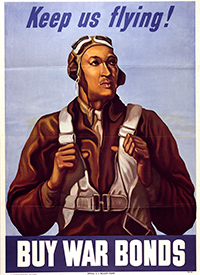 Keep Us Flying! Buy War Bonds National Archives Identifier 514823
Keep Us Flying! Buy War Bonds National Archives Identifier 514823
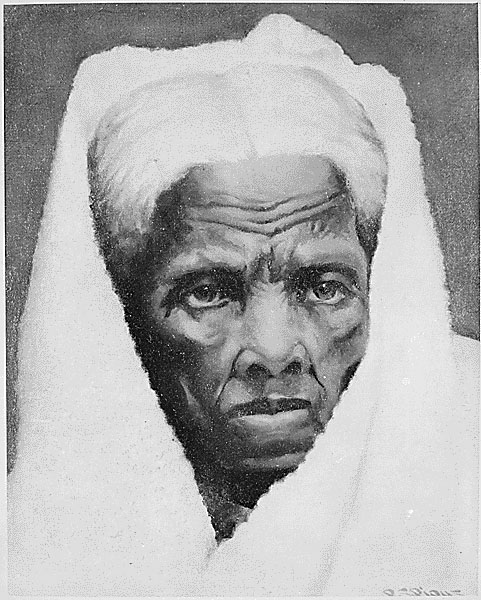
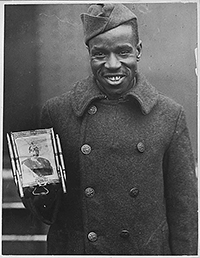 Kaiser s Picture as a Talisman. Corporal Fred McIntyre National Archives Identifier 533516
Kaiser s Picture as a Talisman. Corporal Fred McIntyre National Archives Identifier 533516